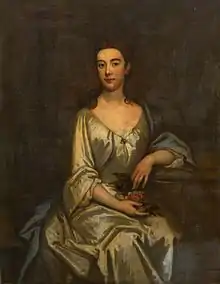John Vaughan, 3rd Earl of Carbery
John Vaughan, 3rd Earl of Carbery KB, PRS (baptised 8 July 1639 – 12 January 1713), styled Lord Vaughan from 1643 to 1686, was Governor of Jamaica between 1675–1678.
The Earl Carbery KB PRS | |
|---|---|
 | |
| Lieutenant Governor of Jamaica | |
| In office 1675–1678 | |
| Monarch | Charles II |
| Preceded by | Henry Morgan |
| Succeeded by | Henry Morgan |
| 7th President of the Royal Society | |
| In office 1686–1689 | |
| Preceded by | Samuel Pepys |
| Succeeded by | Thomas Herbert |
| Personal details | |
| Born | 8 July 1639 |
| Died | 12 January 1713 (aged 73) |
Life
He was the second son of Richard Vaughan, 2nd Earl of Carbery, and his second wife Frances (c.1621 – 9 October 1650), daughter of Sir John Altham of Oxhey, Watford, Hertfordshire. He inherited his title and the Carmarthenshire estate (Golden Grove) in 1686 on the death of his father. His elder brother Francis had already died.
He was invested as a Knight, Order of the Bath (KB) in April 1661. He was Member of Parliament (MP) for Carmarthen between 1661 and 1679 and again for Carmarthenshire between 1679 and 1689. He was one of the Governors of Jamaica from 1674 to 1678.[1] His deputy was the celebrated privateer Sir Henry Morgan. He tried in vain to defeat the Jamaican Maroons, who were led by Juan de Serras.
He had a reputation for debauchery: Samuel Pepys called him "the lewdest fellow of the age". Edward Hyde, 1st Earl of Clarendon, whose impeachment Vaughan strongly supported, called him a man who was "as ugly in face as in fame". As Governor of Jamaica he became notorious for corruption, and was even accused of selling his servants as slaves.
He was President of the Royal Society between 1686–1689, having been elected a Fellow in 1685. He was Colonel of the Regiment of Foot from 1673 to 1674 and Lord of the Admiralty from 1689 to 1690.
On his death his titles became extinct. His estates passed to a cousin, another John Vaughan (1693–1765), who rebuilt the Golden Grove mansion.
Family

Vaughan married twice, first to Mary Brown, daughter of George Brown of Green Castle; they had no children. He remarried on 10 October 1682 to Anne Savile, daughter of George Savile, 1st Marquess of Halifax and his first wife, Lady Dorothy Spencer. They had two children;
- George Vaughan (b. 6 October 1683, bur. 7 May 1685) died aged 2.
- Anne Vaughan (d. 20 September 1751) who in 1713 married Charles Paulet, 3rd Duke of Bolton
References
- . Dictionary of National Biography. London: Smith, Elder & Co. 1885–1900.
- Leigh Rayment's Peerage Pages
- Leigh Rayment's Historical List of MPs
- thepeerage.com
Notes
- "The History and the State of Jamaica under Lord Vaughan". World Digital Library. 1678. Retrieved 19 April 2013.
External links
| Parliament of England | ||
|---|---|---|
| Preceded by Arthur Annesley |
Member of Parliament for Carmarthen 1661–1679 |
Succeeded by Altham Vaughan |
| Preceded by Altham Vaughan |
Member of Parliament for Carmarthenshire 1679–1689 |
Succeeded by Sir Rice Rudd |
| Honorary titles | ||
| Preceded by The Earl of Carbery |
Custos Rotulorum of Cardiganshire 1686–1713 |
Succeeded by The Viscount Hereford |
| Custos Rotulorum of Carmarthenshire 1686–1713 |
Succeeded by Marquess of Winchester | |
| Preceded by Sir Edward Mansel |
Vice-Admiral of South Wales 1689–1713 |
Succeeded by Sir Thomas Mansel |
| Peerage of Ireland | ||
| Preceded by Edward Vaughan |
Earl of Carbery 1686–1713 |
Extinct |
| Professional and academic associations | ||
| Preceded by Samuel Pepys |
7th President of the Royal Society 1686 – 1689 |
Succeeded by Thomas Herbert |